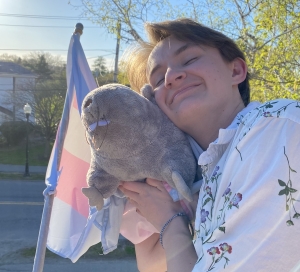
Being Trans at Dartmouth
When I started at Dartmouth in the fall of 2020, I was, by all accounts and appearances, a girl. I introduced myself using the name I was given at birth, told everyone I used she/her pronouns, and had long hair… you get the picture. I'd known on some level that I was trans for years, but when I got to Dartmouth, the supportive queer community and friends I found here helped me get to a place where I was able to do the internal work of figuring out exactly what that meant for me.
By the time I came out as trans my sophomore fall, I'd already been at Dartmouth for a year, so everyone I'd met here watched my transition in real time and had to adjust to me using a new name, my appearance changing, etc. In that sense, because I came out and started transitioning once I was already at Dartmouth, I never had the chance to keep that information private because it was simply very publicly visible. While, of course, something this significant is always tough to navigate in one way or another, I've learned so much and found so many sources of support at Dartmouth throughout this journey that I want to share with you, especially if you're a queer or trans student thinking about coming to Dartmouth! (Side note: this is just my own experience—yours might be different, and that's normal! Not everything is universal, but hopefully, this will provide you with some insight regardless).
Most importantly, when I came out as trans, at first just changing my pronouns and then my name, I found that many people and groups accepted me with open arms. Changing my name in the middle of an academic year was an anxiety-filled process, but it's very easy to change your name in the Dartmouth computer system, and while some of my peers took a bit of time to adjust to the change, I was truly met with positivity and affirmation almost everywhere I went. In fact, most of my friends at Dartmouth are queer, but even outside of my primary social circles and in non-queer organizations and spaces, I've found that most people have been very supportive! There are some queer-specific student organizations, such as Within, but there are countless ways to find a queer community here in unofficial ways. Personally, I've found a lot of my own queer community within gender-inclusive Greek life, but there are trans and queer students all across campus: affiliated and unaffiliated, STEM and humanities majors, athletes and artists alike.

For some trans people, there's a medical aspect to the transition process as well. I'd known for a pretty long time that I wanted to pursue hormone replacement therapy once it was possible for me, and Dartmouth made it just about as accessible as it gets. Dartmouth's student insurance covers hormone replacement therapy through the college health service, and while it is still a multi-step medical process that involves consultations and bloodwork, it was really quite painless compared to the difficulties I've heard of others having with regard to trans healthcare access across the country.
Beyond student organizations and transition resources, there are plenty of academic opportunities to engage with trans identity and community. I've taken four classes in the Women's, Gender, and Sexuality Studies department, including WGSS 53.07: Language, Gender, & Sexuality, which guided me to a much clearer picture of how the way we use everyday language constructs gender as we "know" it. I actually took this course before I came out as trans, and many of the readings helped me to work through questions I was grappling with in my own mind. I've also had a lot of opportunities to engage with topics relating to queer and trans identities in the English, anthropology, and linguistics departments. In ENGL 63.04: Arts Against Empire, as part of an assignment to create our own political art, I took on an amateur photography project highlighting trans and non-binary Dartmouth students in opposition to both homonationalism and transnormativity; in LING 17: Sociolinguistics, we extensively discussed the factors that go into "gendering" a person's voice (fun fact: it's a lot more complicated than just pitch!), as well as the different ways trans people's voices change, whether by medical intervention or voice training and how those impact the different "gendered" elements of the human voice.
I've been lucky to have a really supportive community of other trans and queer people at Dartmouth, and I've also been able to take advantage of a wide array of opportunities to engage with queer identity both in and out of the classroom. That's not to say things are perfect all of the time—being trans inherently comes with its challenges, and Dartmouth is not a bubble neatly separated from the rest of the world, but I will say again that I've met so many enthusiastically supportive people here who have made the process SO much easier than I know it could've been. I'm truly grateful for the ways in which my community here has shaped my journey and continues to shape it every day. That being said, though all blog posts must come to an end, I know this is an especially multifaceted topic, so if you're a trans prospective student who wants to talk in more detail about being trans at Dartmouth, I'm always available via Connect With A Student and would love to answer your questions!
















